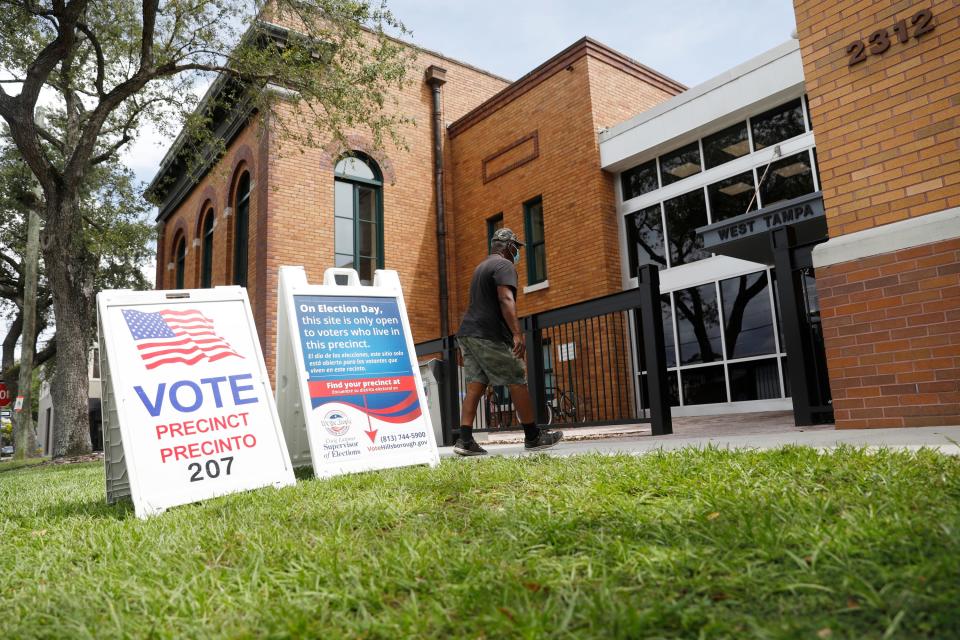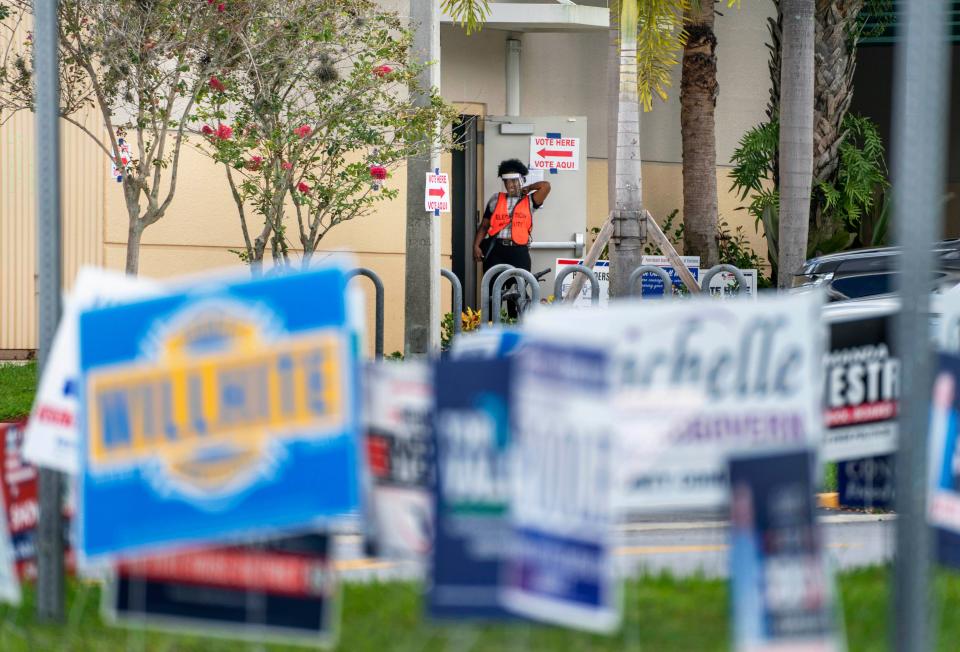Time is running out to block voting restrictions ahead of 2022 midterms, experts say
WASHINGTON – Time appears to be running short for legal challenges to voting restrictions to have an impact before the midterm election, meaning limitations on ballot drop boxes and prohibitions on handing out water at polling places in some states will likely remain in place for now – even if those laws are overturned later.
While the lawsuits will continue long after voters head to the polls this November, the groups challenging the restrictions have faced setbacks in federal court in attempting to temporarily block their enforcement this year. A Florida law limiting the use of ballot drop boxes will likely remain on the books, for instance. So, too, will a Georgia law that reins in third-party groups from mailing absentee ballot request forms to voters.
Many of the restrictions were enacted in GOP-led states in response to false claims of widespread voter fraud by former President Donald Trump. Opponents say the restrictions make it harder for disadvantaged voters to cast a ballot. Supporters say the measures ensure election integrity – and that a little inconvenience is a fair price to pay.
Voting: America's fierce debate over voting access intensifies as midterms loom
SCOTUS: Supreme Court decision could give advantage to new restrictive voting laws
The challenges are running up against a loosely defined doctrine laid down in 2006 by the Supreme Court known as the Purcell principle: the idea that courts shouldn't tinker with the rules of an election at the last minute. The definition of "last minute," though, is very much open for debate.
A number of federal courts have signaled recently that the cutoff has already arrived.
"We are pretty much at that point where if you're hoping to invalidate an election law before the midterm elections, you're probably out of luck," said Jason Snead, executive director of the Honest Elections Project, which advocates for stricter voting laws.
At issue are a number of laws that were made possible by the Supreme Court in the first place. A landmark decision in 2013 freed states with a history of racial discrimination from having to clear changes in voting procedures with the federal government. Last year, in another major decision, the high court weakened the 1965 Voting Rights Act again, making it harder to prove that voting law changes are discriminatory.
President Joe Biden referred to the bigger picture in an address in Philadelphia on Thursday. The president nodded to the "most fundamental freedom in this country," which he described as "the freedom to vote and have your vote counted." That freedom, Biden asserted, was under threat from Republicans loyal to Trump.

Deciding when elections start
Several challenges to an election law signed last year by Georgia Gov. Brian Kemp, a Republican, are pending in federal court. But when plaintiffs sought to temporarily block enforcement of a ban on handing out water and food to voters near polling places, a federal judge relied on Purcell to knock that request down.
That means the law will be in place for the midterms.
Supporters of the practice, known as "line warming," say they distribute food and water to fatigued voters to ensure they stick out the long lines that can develop at some polling places and actually cast a ballot. Opponents say some groups are doing more than providing sustenance: They're indirectly advocating for candidates, which is prohibited near polling places.
U.S. District Judge J.P. Boulee said the plaintiffs had a strong argument that at least part of the ban violated the First Amendment's protection of free speech. But, he said, poll workers had already been trained on the law and it was too late to change course.
Litigation: Lawsuits challenging voting restrictions could alter rules for 2022, 2024
Voter ID: North Carolina Republicans may intervene to defend voter ID, ballot law
"This would create confusion for election officials who previously struggled greatly with how to manage line warming activities," Boulee wrote. "Confused election officials translate into a burden on the Secretary of State’s office, which has fielded incessant questions in the past regarding the appropriate boundaries for line warming activities."
In a separate case, the same judge ruled in July that it was too late to block a law limiting how outside groups mail absentee ballot request forms to voters.
Purcell was also central to the outcome of a challenge over a Florida law that limited the use of drop boxes to turn in an absentee ballot. Signed last year by Republican Gov. Ron DeSantis, the law ended 24-hour-a-day boxes and instead allowed voters to drop off a ballot only if the box was monitored by an election official.
A federal district court sided with the plaintiffs, but the Atlanta-based U.S. Court of Appeals for the 11th Circuit blocked their request for the state's Aug. 24 primary. In its May ruling, the court noted that the primary election was less than four months away, and that Purcell applied.
Ezra Rosenberg, co-director of the Voting Rights Project at the Lawyers' Committee for Civil Rights Under Law, said courts traditionally sought to weigh a state's interest in enacting a voting limitation against its potential harm. But now, he said, some courts apply Purcell in an "almost knee-jerk fashion" that allows alleged discrimination to continue while those cases are decided.
Rosenberg, whose group represents one of the plaintiffs in the Georgia litigation, was speaking generally, and not about a specific case:
"This operates to deprive voters – often voters of color – of their right to vote as the litigation continues through Election Day and perhaps beyond."

Limits of Purcell?
One of the big questions about Purcell is how to define its limits: When is it too close to an election to change the rules? Does the prohibition apply only to courts, or might election officials themselves run up against Purcell by making last-minute adjustments?
Experts say the Supreme Court hasn't provided much clarity.
"We have seen a lot of variability in its application," said Edward Foley, director of Ohio State University’s election law program. "Some of that is probably genuine confusion about how it's supposed to work. Some of it has been different judicial attitude."
The doctrine is based on a 2006 case from Arizona. State voters approved a ballot measure requiring people to show a photo ID to register to vote. The San Francisco-based U.S. Court of Appeals for the 9th Circuit blocked enforcement of the law about a month before the election. In an unsigned opinion with no dissents, the Supreme Court pointed in part to the "imminence of the election" and overruled the appeals court.
Redistricting: Supreme Court permits Alabama congressional map
More: Supreme Court stays lower court decision blocking Alabama congressional maps
Several of the justices weighed in this year in a lawsuit challenging Alabama's newly drawn congressional districts. In that case, the NAACP's Legal Defense and Education Fund argued the new districts discriminated against Black voters. A three-judge panel of the 11th Circuit agreed. But the Supreme Court overturned that decision in February.
A 5-4 majority of the high court allowed Alabama to rely on the congressional map that a lower court said likely denied Black voters in that state an additional member in the U.S. House of Representatives. The majority didn't explain its reasoning, but Associate Justice Brett Kavanaugh cited Purcell in a concurring opinion. Alabama's primary election was set for four months after the decision.
A month later, in a brief, unsigned opinion, the Supreme Court agreed to block a proposed map of Wisconsin's state legislative districts that included an additional majority-Black district. In that decision, which came less than five months before the state's primary, the court said there was "sufficient time" to adopt new maps.
In the Alabama case, Kavanaugh called Purcell a "bedrock tenet of election law." When an election is "close at hand," he wrote, "the rules of the road must be clear and settled."
Writing for the court's three liberal justices, Associate Justice Elena Kagan asserted that "Alabama is not entitled to keep violating Black Alabamians’ voting rights just because the court’s order came down in the first month of an election year."
The Supreme Court will hear arguments in the litigation next month.
Its decision won't land until well after the midterms.
This article originally appeared on USA TODAY: Midterm rules: Courts unlikely to block on voting restrictions in time

